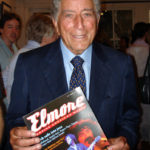Artist: Joan Baez
Album: Whistle Down the Wind
Label: Concord Music Group
Release Date: 3.2.2018

Joan Baez is one of several musicians with roots in the ’60s who have recently announced intentions to cease touring or recording. Ms. Baez is among the senior-most of her class—not necessarily in age (she turned 77 in January), but in terms of longevity. Her self-titled debut album appeared in 1960. Her latest and most likely last album of new material, Whistle Down the Wind, was released on March 2 and will be supported by a North American tour to cap an iconic career.
It’s hard for fans not to expect a major statement when an artist calls it quits, especially an artist associated with songs of social relevance. Baez wrote songs such as “Diamonds & Rust,” but she is better known for interpreting the songs of others, particularly those of Bob Dylan. Whistle Down the Wind finds her curating material written by Tom Waits, Mary Chapin Carpenter, Josh Ritter and Joe Henry, who also produced the album.
The title track, written by Waits and his wife, Kathleen Brennan, finds Joan in fine voice. In recent interviews, she has said she had to re-learn how to sing, now that her voice is not as strong as it was in her youth, but she still sounds warm and welcoming. “Whistle Down the Wind” is a song, appropriately enough, about moving on, to new places if not new phases of one’s life. Josh Ritter’s “Be of Good Heart” is about a different type of moving on—the breakup of lovers. It’s a bittersweet farewell, free of anger and blame, but still acutely aware of “all the loneliness in store.”
The song that hits most powerfully is Zoe Mulford’s “The President Sang Amazing Grace,” a reference to the 2015 Charleston church shooting: “A young man came to a house of prayer, they did not ask what brought him there. He was not friend, he was not kin, but they opened the door and let him in.” Listening to those words in light of the Parkland school shooting and the debate over gun rights being led so eloquently by high school students is a reminder of youthful passion taking the lead where adults have failed.
“Another World” is a haunting tune of a natural world that’s nearly gone while “Last Leaf on the Tree,” another Waits-Brennan composition, is pure whimsy. Mary Chapin Carpenter’s “The Things We Are Made Of” is one of the prettiest songs on the album. Baez says she was afraid to try it after hearing Carpenter perform it live, but the original artist will certainly be pleased with what Joan has done with it here.
It all sounds wonderful: earnest vocals supported by folksy guitar and gentle arrangements. In some ways, it’s a credit to Ms. Baez that she has put together a collection of songs about various forms of leaving without heavy-handed references to herself and her career. Still, given our current state of affairs—the degradation of norms, the lack of civility in our discourse, the violence and the return of demons we thought we as a nation had long ago purged—this listener was hoping for something bolder. It’s an artist’s prerogative to decide what type of statement to make or to make no statement at all. Younger artists might want to play it safe and avoid the risk of alienating audiences, but for those who came of age and built their reputations speaking out, the times seem to demand more. If not now, when?
—Lou Montesano







[…] Lou Montesano for Elmore Magazine […]